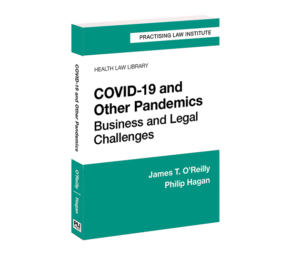COVID-19 And The Law: Helping Clients Through A 'Black Swan' Event
Get the legal background and analysis you need to advise clients through an unprecedented pandemic.
 From contracts, to liability, to risk, clients are facing unprecedented questions related to COVID-19. A year into the pandemic, are you prepared to advise them?
From contracts, to liability, to risk, clients are facing unprecedented questions related to COVID-19. A year into the pandemic, are you prepared to advise them?
In a treatise from PLI Press, COVID-19 and Other Pandemics: Business and Legal Challenges, public health and safety regulation experts James T. O’Reilly and Philip Hagan offer background and analysis that lawyers can use. The first publication to address these complex, evolving issues, the treatise combines practical advice with the latest scientific research and guidelines from key government agencies.
Here are some key points for businesses – and their counsel – to consider as they begin to assess the impact of COVID-19 and to prepare for its long-term consequences:
Contracts are key. If you haven’t brushed up on force majeure since law school, now is a good time to revisit this and other contract concepts. A chapter on “COVID-19, Contracts and Frustration Defenses” provides an overview of contract law for businesses who may have seen their operations interrupted by the pandemic when they, their vendors, or third parties were unable to fulfill contracts. In addition to force majeure clauses, O’Reilly and Hagan explore issues of foreseeability, and defenses to non-performance like impossibility, impracticability, and frustration of purpose.
Employers should continuously evaluate risks and liabilities in their workspaces. OSHA has provided recommendations for how businesses can evaluate the risk of COVID-19 spreading in their workplaces and design systems for preventing transmission. These include both engineering controls, such as workspace redesign and upgrades to office air filtration systems, and administrative controls, which reduce person-to-person contact through “staggered work shifts, downsizing operations, delivering services remotely, and other exposure-reducing measures.” In the treatise, O’Reilly and Hagan adapt these and other recommendations into actionable guidelines.
The book includes an overview of workplace liability claims, looking at potential employer liability for employees who contract the virus on the job. The authors discuss potential theories of liability that employers should be aware of and the evidentiary difficulties that the parties will encounter. In that context, they also dive into the complexities of contact tracing as it relates to employer liability and evidence of infection. In addition, they discuss liability risks arising not just from employees catching the virus, but from customers and other members of the public catching the virus. The authors provide an overview of certain tort concepts, an explanation of workers’ compensation programs, and once again draw on OSHA guidance, or lack thereof, and explain the interaction of these concepts with respect to employer liability.
Focus on active response. Regardless of their type of business, all employers should maintain active response plans that minimize potential COVID-19 exposures to their employees and customers, the authors say. The CDC and other government entities provide guidance that can be incorporated into business operating scenarios.
Plan for “black swans.” In other words: expect the unexpected. Now that a rare event with extreme global consequences has in fact occurred, businesses will endeavor to structure contracts and business plans with risk scenarios in mind. When counseling businesses on planning and liability, think about these “black swan” events and develop strategies accordingly.
To download a complimentary chapter of COVID-19 and Other Pandemics: Business and Legal Challenges from PLI, click here.
Visit PLI’s Coronavirus Developments page to access related webcasts and on-demand programs.
 Practising Law Institute is a nonprofit learning organization dedicated to keeping attorneys and other professionals at the forefront of knowledge and expertise. PLI is chartered by the Regents of the University of the State of New York and was founded in 1933 by Harold P. Seligson. The organization provides the highest quality, accredited, continuing legal and professional education programs in a variety of formats which are delivered by more than 4,000 volunteer faculty including prominent lawyers, judges, investment bankers, accountants, corporate counsel, and U.S. and international government regulators. PLI publishes a comprehensive library of Treatises, Course Handbooks, Answer Books and Journals also available through the PLI PLUS online platform. The essence of PLI’s mission is its commitment to the pro bono community. View PLI’s upcoming live webcasts here.
Practising Law Institute is a nonprofit learning organization dedicated to keeping attorneys and other professionals at the forefront of knowledge and expertise. PLI is chartered by the Regents of the University of the State of New York and was founded in 1933 by Harold P. Seligson. The organization provides the highest quality, accredited, continuing legal and professional education programs in a variety of formats which are delivered by more than 4,000 volunteer faculty including prominent lawyers, judges, investment bankers, accountants, corporate counsel, and U.S. and international government regulators. PLI publishes a comprehensive library of Treatises, Course Handbooks, Answer Books and Journals also available through the PLI PLUS online platform. The essence of PLI’s mission is its commitment to the pro bono community. View PLI’s upcoming live webcasts here.







